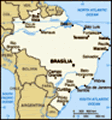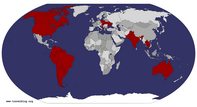Advertisement
Descending over the Bahia Todos os Santos reveals an eye-popping view of a bustiling metropolis of skyscrapers, towering apartment complexes and dingy slums. Paraphrasing one of the great American orators of our time, Ray Nagin, Salvador is a chocolate city. This is not the place to come if you are uncomfortable around people of color. I am the only fair-skinned resident in the neighborhood except for the passing taxi drivers and the British couple with me in the Hotel Maridina. The shift in environment sets a new, exciting tone of discovery. Shops, kiosks, and stands spill onto the sidewalks. Vendors peddle anything and everything that could possibly be sold. The scene is chaotic, yet oddly under control. As a first impression, Salvador overloads the senses with an excess of loud whistles, human commotion of a darker complexion in an exquisite geographical backdrop, within an infrastructure ready to cave in at any time.
Pedestrians not only explain how to manage the ins and outs of Salvador, but will give you a gentle shove in the proper direction followed by a smile and a thumbs-up. The thumbs-up is a universal “Life is good” indication from Brazilians. Look at someone long enough, and if

 All Types
All Types
Never boring in Salvador...she is pretty enough, it will usually evoke a “Tudo bom?” We share brief smiles and I reply to her, “Yes, all is well.” We walk away from each other and assume our original plans.
The Pelourinho is the colonial enclave of Salvador from which even the very adventurous rarely stray very far. Its dark brick, claustrophobic, perpendicular streets and slowly unraveling buildings are why Salvador, in spite of its dark reputation for crime, will keep receiving the multitudes. Amid souvenir stands, art stands, Internet cafés, beggars, and roaming vendors, it is as tacky as it is beautiful. Rastafarians dominate the scene. Colorfully knit caps cover their copious and meticulously designed hair. Many set up small stands to sell trinkets, what they call jewelry. The Pelourinho sucks in an element of Western traveler who has come to soak in Salvador for a few weeks and wind up staying for months on end. How out of place he looks in a tie-dye shirt, Rasta braids, filthy sandals, aside an unshaven, stubbled man of West African descent who looks the part perfectly. It is reminiscent of Arnold Schwarzenegger and Danny DeVito in Twins. They are dressed identically, but that’s where the similarities

 Home in the Cidade Baixa
Home in the Cidade Baixa
I saw a man sewing his pants in a window...end.
Even at night, the Pelourinho is duplicitous in nature. Exciting percussion blends resound against churches and fountains. The rhythms intensify the nearer you approach. Turn the corner and the sensation of electricity in the air is almost tangible. Dozens of people dance in unison with the metrical cadences. Restaurants have placed tables and chairs through the neighborhood to accommodate the expected onslaught of nighttime visitors. Strings of suspended Christmas-like lights are suspended from the outer walls overhead. That said, shady characters lurk without a sound in the Pelourinho’s concave doorways. Some either shabbily dressed or asleep in tatters, it is not immediately clear which are harmless and which are those of whom you must be aware.
Armed police linger throughout the Pelourinho and lend a sense of security to the visitor. But nothing could be more erroneous. No matter what you have heard or how the tourist office or long-time locals spin it, Salvador is a very, very dangerous city. Police squads take their post at 7:30 am. Their shifts change between one and one thirty. This is when to be most on guard. To be alone, meaning twenty yards from another group of people and to display

 Calm and Collected
Calm and Collected
Coastal and beach neighborhood...the teeniest decline in self-awareness will attract thieves. As I detest hypertourism, my initial instinct is to make that sharp left away from the lanyard-laden tour groups from Chile, a dubious decision in Salvador. Even the armed guards cannot deter all the street crime. Unlike lawless São Paulo where visitors do not gather around the watering hole in herds to sheepishly take a drink, tourists are vulnerable and confined wildebeest for the concealed lioness looming in the urban bush. It is only a matter of time before one becomes a victim. The air-conditioned municipal precinct on the Praça de Sé has already registered three muggings today and it is only three in the afternoon.
Most large cities throughout the world have welcomed the concept of the Irish pub. Salvador’s contribution is the recently established The Dubliner’s, however misplaced the apostrophe. If your idea of an authentic Irish pub in the tropics of Brazil is one of a barren, tan room of three wooden booths run by dainty young black people who speak a confusing local dialect of Portuguese, then by golly, look no further. The Dubliner’s is as Irish as the cans of Guinness the bar staff dusts off

 Always needed
Always needed
Security patrol on beach...before pouring into fist-sized glasses. As the bar does not open until after dark, I regretfully cannot call it home, unlike Ian and Jeffrey from Sheffield, England. They have been assigned to Salvador by their electronics firm and have become its only true regular patrons. Bellied up to the bar with Crystal, the local beer in Salvador, Ian feels comfortable because he can speak English within its walls.
“But, Ian” I interjected, “none of the ladies speak anything but Portuguese.”
“Not true! They know ‘beer’, ‘money’, and do their best to smile at me when we haven’t a clue what we’re saying. Good enough for me.”
The rest of the conversation surrounded Jeffrey’s approval of his wife, who permits him to take foreign contracts all over the world. “What a woman. Just love the doll. So, every now and then, I have her join me in Rio so she can go shopping.”
I had to ask. “How much did she blow last time? Jeffrey is not an upper crust fellow.
“A few thousand pounds. Aahh. She’s worth it!”
Salvador’s severe drop in elevation between lower town and the upper entices commuters to use the Elevador Lacerda, a public elevator that deposits the masses at the harbor terminal. The public forms lines that snake for several hundred yards and the elevator cars swallow them up in bites of twenty or so. The region directly in the vicinity of the Cidade Baixa is, on a good day, forgettable. Hollow, yet miraculously occupied dark, smoky concrete remnants of what used to be buildings line the boulevard next to the elevator entrance. Many are roofless and doused in moss. Positioned between the elevator and the terminal is the Mercado Modelo, a frightening concentration of touts in desperate, yet furious competition with each other to sell the most atrocious collection of beeds, T-shirts, trinkets, and assorted refuse.
“I am just looking.” Don’t even bother with such a move. “Amigo, you need shirt? Nice necklace, good price. Special for you. I love you, my capitalist friend!” It never ends. If you make the fatal error of stopping, glancing at the merchandise, turning your neck in any direction, or exposing an irregular gait in your step, the vendors are on you quicker than famished teenagers pounce on free pizza.
By the time I walked into the hollow harbor terminal, I shrugged my shoulders at the overpriced daily tours of Todos Os Santos Bay and left indignant that no one would be separating me from my cash for the excessive amounts companies charge. Tomorrow, I thought, I will go to Barra, where Todos Os Santos and the Atlantic Ocean join. I hear it is a refreshing beach scene, and not all that bad for a densely populated area.
The Internet do Farrol is much more a café than a place to check your e-mail. It is run by Eduardo and his wife, who have just taken over its operations. They came to Salvador for a thirty-day stint and decided to stay. Neither speaks brilliant Portuguese, but customers take an immediate liking to them, as did I. Eduardo sips on mate, a tea representative of Argentina and Uruguay. It takes little effort form him to speak of his parent’s farm outside of Montevideo and how he laments that Uruguay was once a prosperous country, which has shifted its priorities away from the values he knew as a child. Yet, he appears content. Anyone would be with the view from his seat of a brilliant blue bay bordered by a bright ivory colonnade guardrail right across the street.
Indeed the Barra neighborhood uplifts the sprits. Though not spectacular, beaches are attended to and guarded by the Polícia Militar. I feel safer here than in the Pelourinho. Guesthouses cater to a crowd that desires a maximum amount of sun exposure and a minimum amount of thinking. A lighthouse stands guard over the entrance to the bay. Although eye catching, it is little more than an attractive landmark. Foreign men in spandex and flip flops clutch onto recently acquired “girlfriends”. They cannot speak to each other. Yet, to make the arrangement work, however temporary, handfuls of these new couples come into Eduardo’s café and instantaneously log onto freetranslation.com.
Advertisement
Tot: 0.037s; Tpl: 0.011s; cc: 9; qc: 23; dbt: 0.0179s; 1; m:domysql w:travelblog (10.17.0.13); sld: 1;
; mem: 1.1mb











